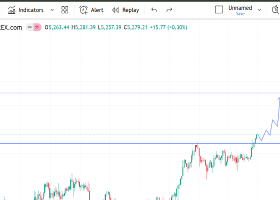
ECB, BOJ Seeking to Push Down Exchange Rates, Mervyn King Says
ECB, BOJ Seeking to Push Down Exchange Rates, Mervyn King Says
The European Central Bank and the Bank of Japan are essentially trying to push down the values of their respective currencies with the use of negative interest rates, former Bank of England Governor Mervyn King said.
“There are clearly limits” to the effectiveness of negative rates, King said Monday in a Bloomberg Television interview in New York with David Gura. “I think you can see with Japan and the euro area, that in essence, the central banks are trying to push down the exchange rate. Most countries in the world could say now, ‘If only the rest of the world was growing normally, we’d be fine. But since it isn’t, we aren’t. What’s left? Push down the exchange rate.’”
The ECB and BOJ contend they’re not intentionally aiming for weaker currencies with easing policies aimed at boosting growth and inflation. ECB President Mario Draghi said earlier this month that while “it is true that some of the measures have obviously a spillover on the foreign-exchange market,” the measures introduced “are entirely addressed to our economy” and that the ECB is “not in this war at all.” The BOJ has denied it’s seeking to manipulate the yen’s exchange rate.
Global finance ministers and central bankers, in their Group of 20 meeting in Shanghai last month, reiterated past pledges to refrain from competitive devaluations of their currencies.
“Not everyone can push down the exchange rate -- so far, most countries have been trying to do that at the expense of the U.S. dollar,” King said. “Now even the Federal Reserve is concerned about the strength of the U.S. dollar.”
While minutes of the BOE’s meeting this month show officials didn’t discuss negative rates during their latest decision, King’s successor, Governor Mark Carney, told lawmakers last month that officials have “considerable room” to ease policy if needed.
‘Brexit’ Vote
Looming over the U.K. outlook is the country’s June 23 referendum on membership of the European Union. BOE officials say uncertainty surrounding the vote has caused sterling to depreciate and may weigh on growth and investment, and Carney has been pulled into the political debate.
King, who was head of the U.K. central bank from 2003 to 2013, said taking a stance on “Brexit” would be “unfair” to Carney. At the same time, “the euro zone faces very serious problems from which there is no easy way out” and “it was a mistake to create the single currency,” King said.
“The future of the European Union will undoubtedly be, in my view, two different groups of countries: one group in the euro area and the other group outside it,” King said. “So whether or not the U.K. stays in the European Union, no one in Britain actually wants us to join the euro,” he said.
The “Brexit” vote is also likely to feature on the agenda of BOE financial policy officials meeting this week, who can deploy tools on everything from curbs on home loans to the cushions banks hold against potential losses.
King said the amount of equity capital banks hold relative to assets “probably needs to go further in the long run, but that’s not an immediate issue” because there has been a “big improvement” since the crisis.
“We’ve gone far too far in the way of detailed regulation, much of which would be irrelevant to a future crisis,” King said. “Simple measures to ensure the resilience of the banking system are infinitely more important than thousands upon thousands of pages of detailed rules.”
The role of central banks in the future will be up for a “big debate because of the extent to which central bank mandates have expanded, often by default to deal with the crisis,” King said. “We face a very uncertain world and we need intelligently and collectively to respond to it.”


